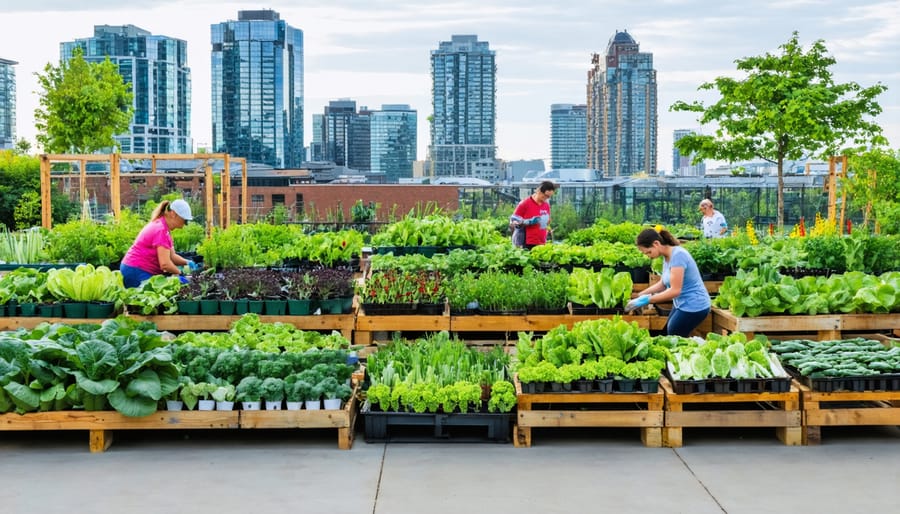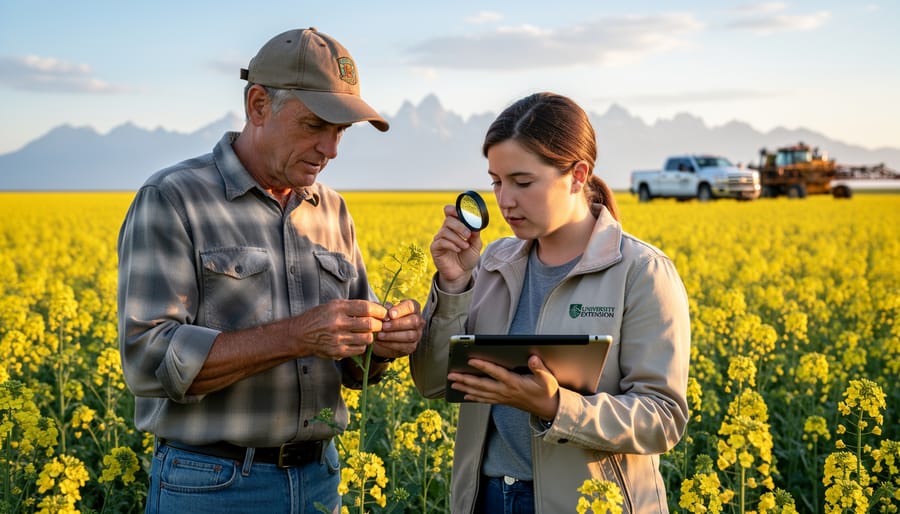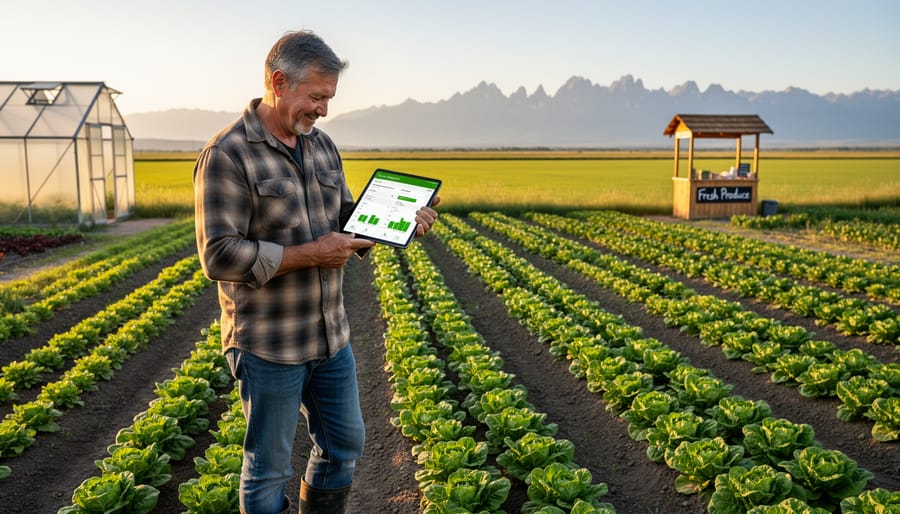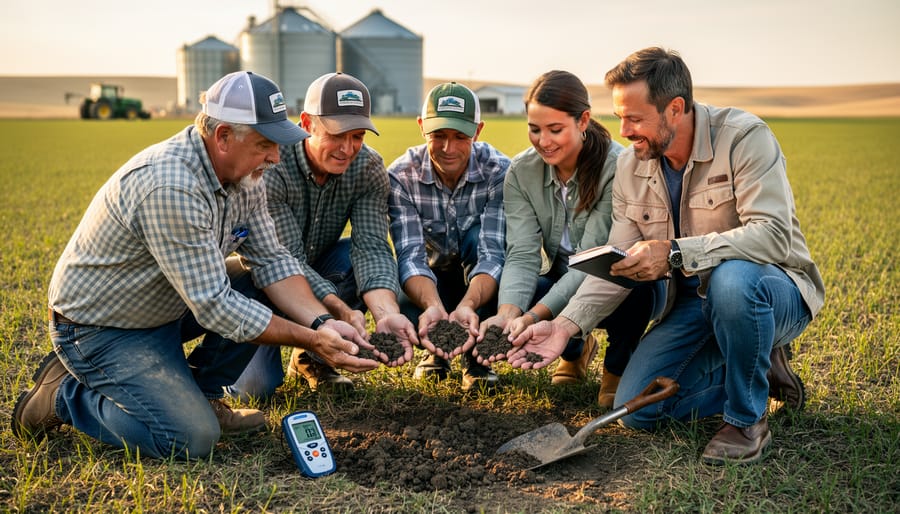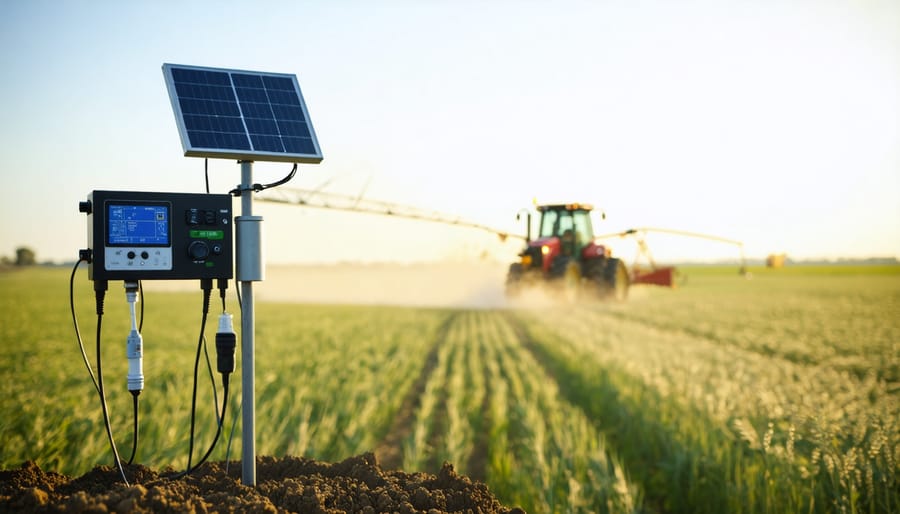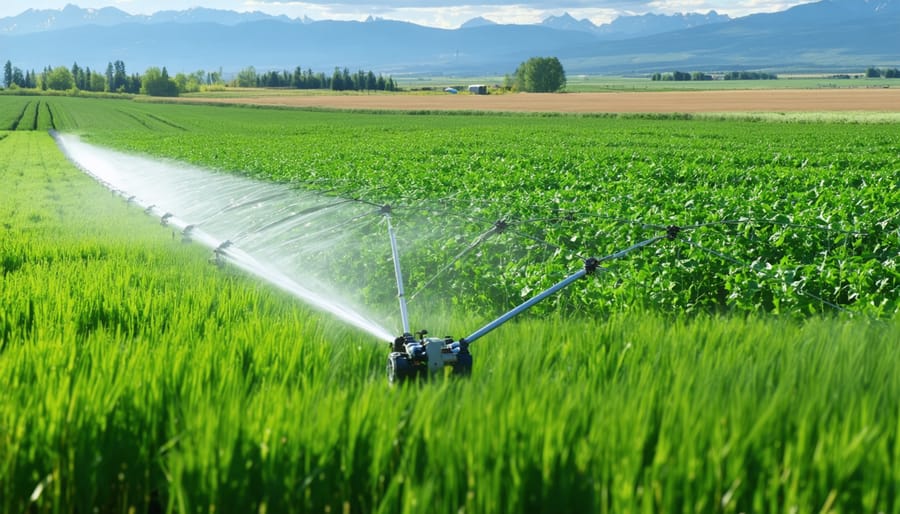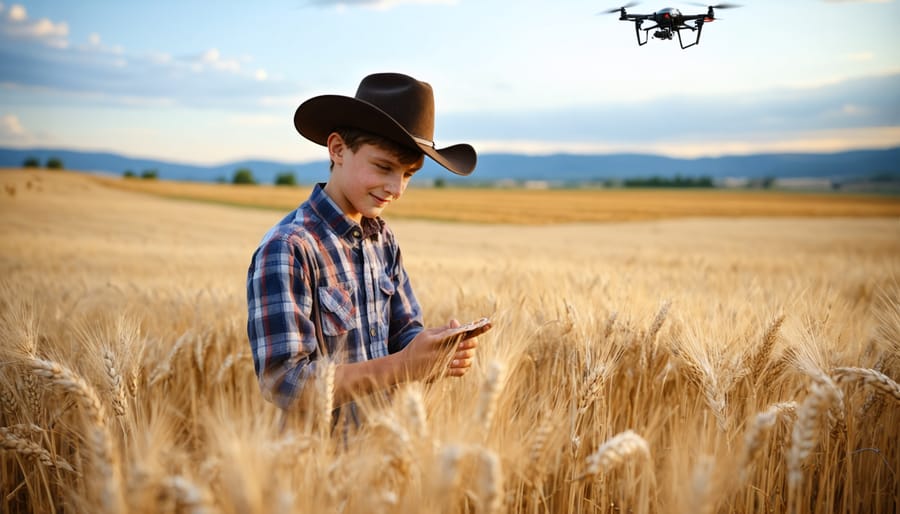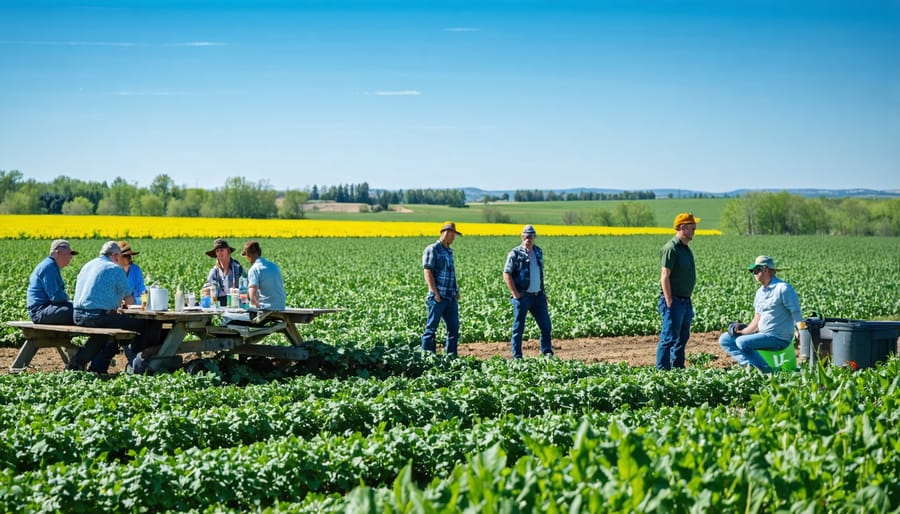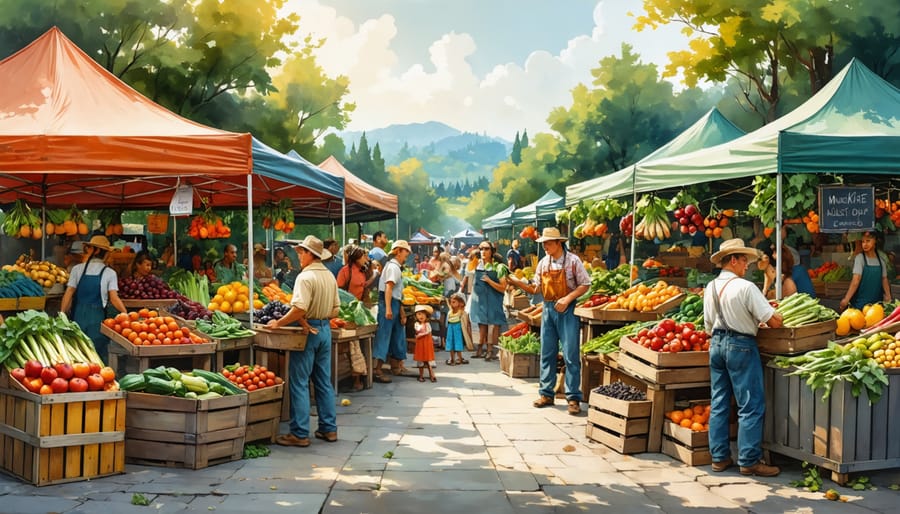Urban agriculture stands at the forefront of sustainable city development, transforming concrete jungles into productive green spaces that feed communities and fight climate change. Across Canadian cities, from Calgary’s rooftop gardens to Edmonton’s community plots, urban farming initiatives are revolutionizing how we think about food security and environmental stewardship. These innovative agricultural practices merge traditional farming wisdom with modern technology, creating resilient food systems that reduce carbon footprints while building stronger communities.
In Alberta alone, urban agriculture projects have demonstrated remarkable success, with community gardens producing over 2,000 kilograms of fresh produce annually per hectare while reducing greenhouse gas emissions by up to 30% compared to traditional farming methods. These initiatives not only provide fresh, locally-grown food but also create green job opportunities, enhance biodiversity, and improve urban air quality. The integration of sustainable practices such as rainwater harvesting, composting, and vertical farming techniques has proven that cities can become powerful centers of agricultural innovation.
As climate challenges intensify and urban populations grow, the intersection of agriculture and city living offers practical solutions for food security, environmental protection, and community resilience. Through careful planning, innovative technology, and community engagement, urban agriculture is transforming our cities into sustainable food production hubs while addressing crucial environmental concerns.
This agricultural revolution in our cities isn’t just about growing food—it’s about growing smarter, more sustainable communities for future generations.
The Urban Farming Revolution in Alberta
Success Stories: From Empty Lots to Thriving Gardens
Edmonton’s Riverdale Community Garden stands as a shining example of what’s possible when passionate residents commit to starting a community garden. What began as a vacant lot in 2015 has transformed into a thriving 2,000-square-metre urban farm that now produces over 2,500 kg of fresh vegetables annually, supporting 45 local families.
In Calgary, the Grow Calgary initiative converted 4.5 hectares of unused land near Canada Olympic Park into Canada’s largest urban agricultural project. Through volunteer efforts and innovative growing techniques, they’ve provided fresh produce to local food banks since 2013, helping over 3,000 families annually.
The Medicine Hat College Urban Farm Project demonstrates the educational potential of urban agriculture. Students transformed a 500-square-metre campus lot into a productive teaching garden, implementing vertical growing systems and aquaponics. The project now serves as both a practical learning facility and a source of fresh produce for the campus cafeteria.
Lethbridge’s Downtown Community Garden showcases how urban agriculture builds community connections. Started by local seniors in 2017, the garden has expanded to include 75 plots, a communal herb garden, and a children’s learning area. The project has become a hub for intergenerational knowledge sharing and sustainable growing practices, producing approximately 1,800 kg of food annually while reducing participants’ grocery bills by an average of 30%.
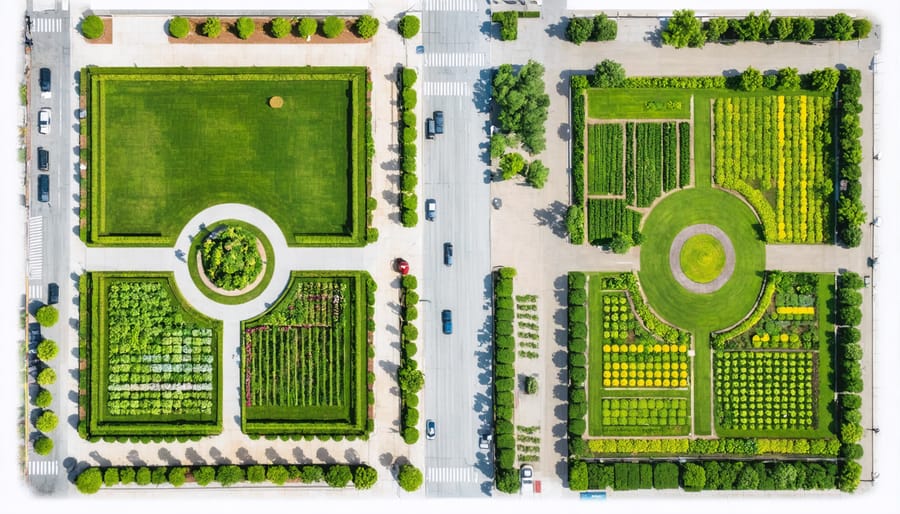
Community Benefits Beyond Food Production
Urban agriculture delivers far more than just fresh produce to our communities. In Edmonton’s Northlands Urban Farm, for instance, we’ve seen how these initiatives create valuable gathering spaces where neighbours connect and share knowledge. The farm hosts weekly markets that bring together over 200 community members, fostering social bonds while supporting local food security.
From an economic perspective, urban farming initiatives across Alberta are creating meaningful employment opportunities. The Grow Calgary project has demonstrated how urban agriculture can provide valuable job training for newcomers and youth, while generating revenue that stays within the community. These programs often partner with local businesses, creating sustainable micro-economies that benefit the entire neighbourhood.
Environmental benefits extend beyond reduced food transportation emissions. Urban gardens and farms act as green spaces that help manage stormwater runoff, reduce urban heat island effects, and support local biodiversity. The Calgary Tower Garden Project, for example, has documented increased bird and pollinator activity since its inception, while helping to cool the surrounding area by up to 3°C during summer months.
These spaces also serve as outdoor classrooms, offering hands-on learning opportunities for students and community members. The University of Alberta’s Green & Gold Garden has become a living laboratory where agricultural students gain practical experience while providing fresh produce for campus food banks, creating a model of educational and social impact working in harmony.
Educational Integration: Building Urban Farming Knowledge
School Garden Programs
School gardens are becoming powerful learning hubs across Alberta, transforming traditional agricultural education programs into hands-on experiences that connect students with sustainable food production. At Edmonton’s Riverside School, students from grades 3-6 maintain a 200-square-metre garden, growing everything from heritage vegetables to native pollinator plants.
These garden programs do more than teach basic farming skills. They integrate seamlessly into multiple subjects: mathematics through plot planning and harvest calculations, sciences through soil testing and plant biology, and social studies through exploring local food security and Indigenous growing practices.
Calgary’s Green Schools Initiative has already implemented gardens in 15 schools, reaching over 3,000 students annually. The program partners with local farmers who mentor students and teachers, ensuring growing practices align with Alberta’s climate challenges. Students learn season extension techniques using cold frames and greenhouse systems, allowing for year-round growing despite our shorter growing season.
The impact extends beyond the classroom. Many schools have established partnerships with local food banks, donating fresh produce while teaching students about community service. Parents report increased interest in home gardening and healthier eating habits among participating students. These programs are creating the next generation of urban agriculture advocates, equipped with practical knowledge of sustainable food systems.

Community Learning Hubs
Community learning hubs have become vital centres for knowledge exchange in Alberta’s urban agriculture movement. These grassroots initiatives bring together experienced farmers, gardening enthusiasts, and newcomers to share practical skills and sustainable farming techniques. The Edmonton Urban Farm, for example, hosts weekly skill-sharing workshops where participants learn everything from soil management to season extension methods.
In Calgary, the Grow Calgary collective has established a successful mentorship program connecting seasoned urban farmers with those just starting their growing journey. These partnerships have proven particularly valuable for newcomers to Canada who bring diverse agricultural knowledge from their home countries while learning about local growing conditions.
Regular workshops cover essential topics like composting, water conservation, and organic pest management, with hands-on demonstrations that make complex concepts accessible to all skill levels. Many hubs have introduced certificate programs in urban agriculture, providing structured learning paths for community members interested in pursuing urban farming professionally.
The Red Deer Urban Agriculture Network has pioneered a unique approach by partnering with local schools to create intergenerational learning opportunities. Senior farmers mentor students in sustainable growing practices, while young participants contribute fresh perspectives on technology and modern farming innovations.
These community hubs also serve as important networking spaces where urban farmers can exchange seeds, share equipment, and build lasting connections that strengthen local food systems.
Professional Development Opportunities
The urban agriculture sector in Alberta offers numerous professional development pathways for aspiring urban farmers. The University of Alberta’s Faculty of Extension provides a comprehensive Urban Agriculture Certificate program, combining hands-on experience with theoretical knowledge in sustainable farming practices.
Local organizations like YYC Growers and the Edmonton Horticultural Society regularly host workshops focusing on essential skills such as soil management, greenhouse operations, and season extension techniques. These programs are particularly valuable for those looking to transition from traditional farming to urban agriculture methods.
The City of Calgary’s Urban Agriculture Partnership Program offers mentorship opportunities, connecting experienced urban farmers with newcomers to the field. Participants gain practical experience in commercial urban farming operations while learning about business planning and market development.
Several technical institutes across Alberta provide specialized courses in hydroponics, vertical farming, and controlled environment agriculture. These programs typically run for 4-6 months and include hands-on training with modern agricultural technology.
For those seeking flexible learning options, online certification programs through Olds College focus on sustainable urban farming practices and business management. Additionally, the Alberta Urban Agriculture Network hosts monthly webinars and networking events, allowing practitioners to share knowledge and build professional connections within the community.
Funding support for professional development is available through Alberta Agriculture and Forestry’s Canadian Agricultural Partnership program, making these opportunities more accessible to interested individuals.
Sustainable Practices for Urban Agriculture
Water Conservation Techniques
In urban agriculture, effective water-efficient gardening techniques are essential for sustainable food production, particularly in Alberta’s semi-arid climate. Many local farmers have successfully implemented drip irrigation systems, which can reduce water usage by up to 70% compared to traditional sprinkler methods.
Smart irrigation controllers and soil moisture sensors have become increasingly popular among Edmonton and Calgary urban farmers. These systems automatically adjust watering schedules based on local weather conditions and soil moisture levels, ensuring optimal water usage while maintaining crop health.
Rainwater harvesting has proven particularly effective in our region, with many urban farms installing collection systems that can store between 1,000 to 5,000 litres of water. Simple solutions like rain barrels connected to greenhouse gutters can provide substantial water savings during our dry summer months.
Mulching practices have shown remarkable results in local community gardens, with organic materials like straw or wood chips reducing evaporation by up to 70%. Calgary’s Urban Farm Collective reported a 40% reduction in irrigation needs after implementing heavy mulching techniques.
Innovative solutions like wicking beds are gaining traction in Alberta’s urban agriculture scene. These self-watering systems use capillary action to deliver water directly to plant roots, reducing water consumption by up to 50% while promoting stronger root development. Local success stories include the Edmonton Urban Farm, which converted 30% of their growing space to wicking beds and saw significant water savings in their first season.
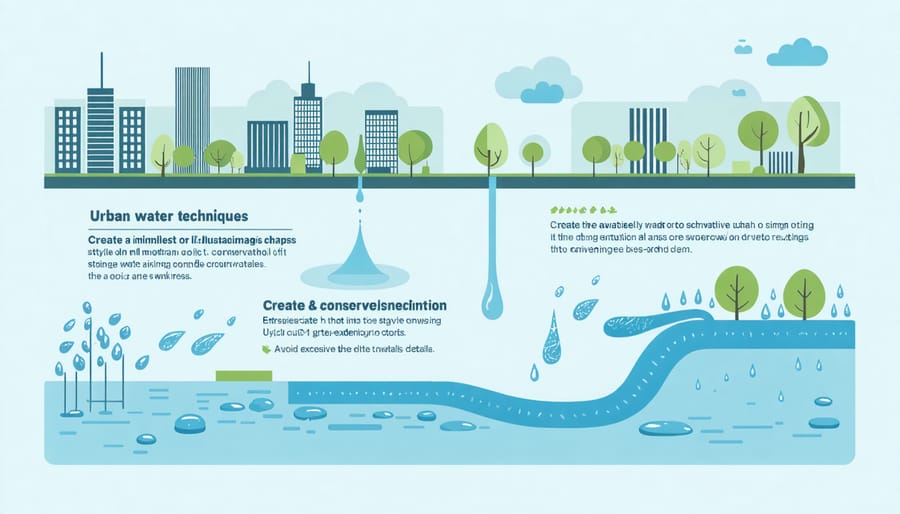
Organic Waste Management
In urban agriculture, effective organic waste management is crucial for maintaining soil health and reducing environmental impact. Alberta’s urban farmers have been pioneering innovative urban composting methods that work even in limited spaces. The Calgary Urban Farmers Collective, for example, has successfully implemented a community-scale composting program that processes over 2,000 kg of organic waste monthly.
Creating healthy soil starts with proper sorting of organic materials. Kitchen scraps, yard waste, and agricultural residues should be separated to maintain optimal carbon-to-nitrogen ratios. For urban farmers working with smaller plots, vermicomposting has proven particularly effective, with red wiggler worms processing up to 2 kg of organic matter per square metre weekly.
Many Alberta urban farmers have adopted the “hot composting” technique, which can transform organic waste into usable compost in 6-8 weeks, even during cooler months. This method maintains temperatures between 55-65°C, effectively breaking down materials while eliminating potential pathogens and weed seeds.
Soil health monitoring is equally important. Regular testing helps maintain optimal pH levels (typically 6.0-7.0) and nutrient content. The Edmonton Urban Farm Network offers monthly workshops on soil testing and amendment strategies, helping farmers make informed decisions about their composting practices.
To maximize space efficiency, vertical composting systems have gained popularity among urban farmers. These systems can process up to 100 litres of organic waste in a 1-square-metre footprint, making them ideal for compact urban farming operations while contributing to sustainable waste management practices.
Energy-Efficient Growing Methods
In urban agriculture, energy efficiency isn’t just about cutting costs – it’s about creating sustainable growing systems that work for our Canadian climate. Here in Alberta, we’ve seen remarkable success with innovative approaches that minimize energy use while maximizing yield.
LED grow lights have become a game-changer for indoor urban farms, consuming up to 75% less electricity than traditional growing lights while providing optimal spectrums for plant growth. Many Edmonton-based operations have successfully integrated these systems, particularly during our shorter winter days.
Passive solar greenhouses are gaining traction across the province, utilizing thermal mass materials and strategic design to maintain consistent temperatures without excessive heating costs. The Groundwork Urban Farm in Calgary demonstrates how proper orientation and insulation can extend the growing season by up to three months while reducing energy consumption by 40%.
Heat recovery systems are another vital component, capturing and recycling warm air from various farm operations. Several successful urban farms in Red Deer have implemented these systems, reducing their heating costs by 30-35% during winter months.
Automated climate control systems, while requiring initial investment, have proven their worth in optimizing energy use. These smart systems adjust temperature, humidity, and ventilation based on real-time conditions, ensuring energy is used only when needed. Local data shows farms using these systems typically see a 25% reduction in overall energy consumption within the first year.
Future Growth: Expanding Urban Agriculture in Alberta
Policy Development and Support
Several Canadian municipalities are leading the way in developing supportive policies for urban agriculture. Calgary’s Urban Agriculture Action Plan, launched in 2022, provides clear guidelines for establishing community gardens and small-scale urban farms while offering tax incentives for property owners who convert unused spaces into agricultural land.
Edmonton’s Urban Hen and Urban Beekeeping programs demonstrate how cities can create frameworks that balance food production with urban living. These initiatives include simplified permit processes and educational resources for residents interested in backyard farming.
The City of Red Deer recently introduced grants for urban agriculture projects, offering up to $5,000 for community-led initiatives. These funds support everything from vertical farming systems to greenhouse construction.
Province-wide, Alberta’s Agricultural Societies Program continues to adapt its funding criteria to include urban farming projects, recognizing their role in sustainable food production. Local food security organizations are working with municipal governments to develop zoning amendments that accommodate innovative farming practices like rooftop gardens and indoor vertical farms.
Recent consultations with urban farmers have led to proposals for streamlined business licensing and reduced water rates for agricultural activities, showing promise for future policy development.
Technology Integration
Modern technology has revolutionized urban agriculture in Alberta, making sustainable farming more efficient and accessible than ever before. Smart sensors and automated systems now allow farmers to monitor soil conditions, temperature, and moisture levels in real-time through their smartphones. These innovations have been particularly transformative in vertical farming systems, where precise environmental control is crucial for optimal crop yields.
Local tech startups in Calgary and Edmonton are developing AI-powered solutions that help urban farmers optimize resource usage and predict harvest times. For instance, hydroponics systems equipped with IoT devices can reduce water consumption by up to 90% compared to traditional farming methods. LED grow lights, specifically calibrated for different growth stages, enable year-round production even during Alberta’s harsh winters.
Many community gardens across the province are now incorporating simple tech solutions like automated irrigation systems and climate-controlled greenhouses. These technologies not only improve productivity but also make urban agriculture more accessible to newcomers, helping build a more sustainable and food-secure future for our communities.
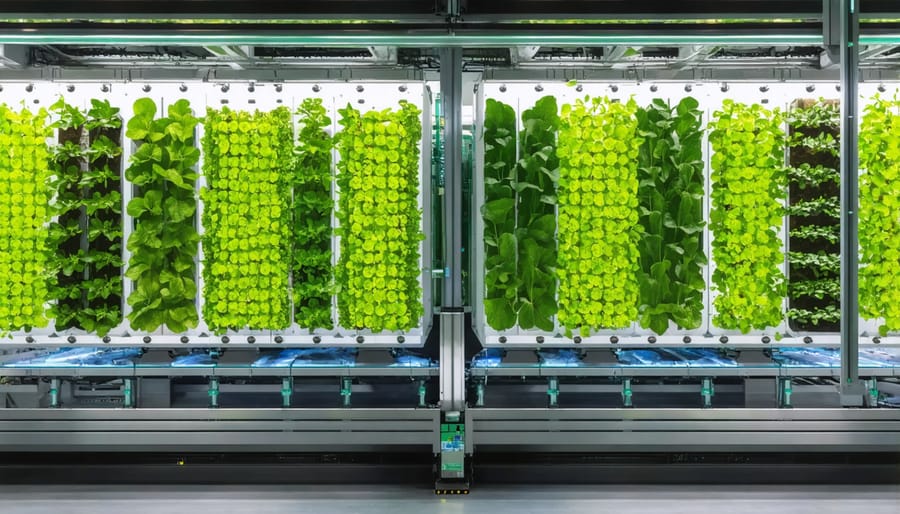
Urban agriculture represents a powerful intersection of community development, environmental stewardship, and food security for Alberta’s growing cities. Throughout this exploration of urban farming practices, we’ve seen how local initiatives are transforming unused spaces into productive growing areas, building stronger communities, and promoting sustainable food systems.
The success stories from Edmonton’s urban farms and Calgary’s community gardens demonstrate that sustainable urban agriculture is not just possible but thriving in our climate. These projects show how combining traditional farming knowledge with innovative techniques can create resilient food production systems that benefit both people and the environment.
As we look to the future, the role of urban agriculture in creating sustainable cities becomes increasingly important. Whether you’re a seasoned farmer, a hobby gardener, or someone interested in food security, there are numerous ways to get involved. Consider joining a community garden, supporting local urban farming initiatives, or starting your own growing project.
The time to act is now. Our communities need engaged citizens willing to contribute to a more sustainable food future. Start by reaching out to your local agricultural society or urban farming cooperative. Attend workshops, share your knowledge, and connect with fellow urban farmers. Every container garden, rooftop greenhouse, and community plot contributes to a more sustainable and food-secure Alberta.
Remember, urban agriculture is more than just growing food—it’s about building resilient communities, reducing our environmental impact, and creating a lasting legacy for future generations. Together, we can transform our cities into productive, sustainable landscapes that nourish both people and planet.

